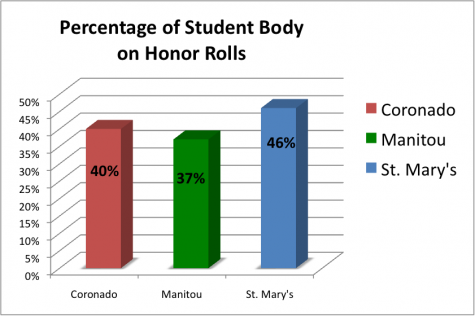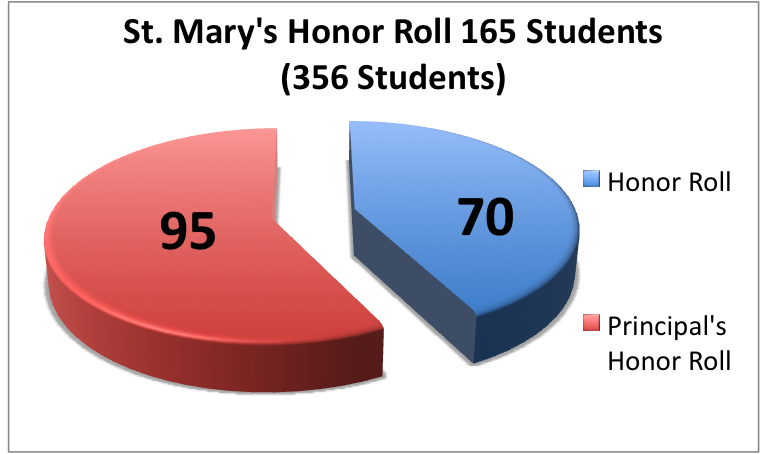Your donation will support the student journalists of Manitou Springs High School. Your contribution will allow us to purchase equipment and attend local conferences and trainings!
Editorial: Honor Roll Analysis Reveals Average Statistics, but Causes Aren’t Obvious
Manitou rides the average fence in honor roll and act score.
March 14, 2016
A couple weeks ago, the honor roll and honorable mention students for last quarter were announced. Looking at that very long list of students, we wonder if MSHS students are average academically. When the math is done, 22 percent of students who go to MSHS are on the honor roll. That’s 115 students with a GPA of 3.75-4.0, and 13 percent, or 70 students are honorably mentioned (GPA of 3.5-3.7499). You would think that’s a large proportion, but we have a lower percentage of students on the honor roll than Coronado or St. Mary’s.
How are we suppose to interpret the data? Fewer Manitou students were able to make the grade despite an internally weighted system that gives honors classes as much as a 3 percent advantage over our neighbors (an 87% in Manitou is an A-, where as at Coronado, the standard is 90%).
 Coronado has 1556 students compared to Manitou’s 515; St. Mary’s has 338 students.
Coronado has 1556 students compared to Manitou’s 515; St. Mary’s has 338 students.
The biggest factor may be from the block system. Neither Coronado nor St. Mary’s has a block system and they have high percentages of students that achieve academically. In the block system, teachers feel rushed to try to meet the state’s expectations. For instance, when students walk into math class at Manitou the teacher tells them that they will have a lesson per day, sometimes two. This can be overwhelming, especially with students who aren’t the greatest at math. The block system may be the problem with how low the percentages are. Manitou encourages students to do well, but when classes are rushed this could be quite hard.
With the block system having a ninety minute class can be tiring and the material may become boring. If the student is just struggling, they should ask for help.
On the other hand, students like Tucker Kennedy (11) who have experienced both schools say the block system benefits them.
“I went to Coronado… and with seven classes and being an hour long the teachers give you more homework,” Tucker Kennedy (11). “The smaller class sizes at Manitou and longer classes help.”
Our material may just be more rigorous. Kids may have taken a course thinking it wouldn’t be as hard as they thought and the student just doesn’t understand the material. Students may need to talk to the teacher and ask for help. Maybe we should promote more self-motivation? Or we give too much homework. You would think since we have 4 classes we get less homework. In reality, we get more homework and homework is a large portion of our grades. Teachers will argue that homework is good practice, but there is a point when it is too much. Greater rigor may give us greater challenges, but it is hard to argue when the percentages are lower.
Our grades aren’t necessarily the biggest factor of manitou’s performance. Testing does come into factor and how well students perform on standardized tests.
“I find school hard because tests are about how much you can remember rather than if you understand the subject. If you don’t do great on tests you grade will be affected dramatically. Not to mention if you miss a day with the block system it’s hard to get caught up,” Alli Marte (10).
Students have said many times that standardized testing is a waste of time. This would probably be due to how different each student learns. There are 7 different ways one can learn, visual, solitary interpersonal (prefer to work by yourself), social interpersonal (work in groups), mathematical, kinesthetic, verbal, and auditory. In school not all of these are covered to help the student learn better. Standardize testing may not be the best way to test a student if they know the material, especially if the student has test anxiety.
Does all of this focus on grades even matter? You probably remember your freshmen year, the counselor came into one of your classes and told you how good grades don’t strictly matter. They said that colleges will look at your GPA, but if they see you are taking honors classes, it will look better on your transcript, even if you get lower grades. Though this is true, colleges still care about your GPA, especially if you want to go to higher ranked colleges like Columbia University or Duke University. Even state colleges like Colorado State University in Fort Collins weigh your ACT score against your GPA to determine your acceptance.
Last year the ACT scores w ere published in a story in the Gazette. Manitou scored 20.9, Coronado 20.8, and St. Mary’s, 25. Seeing that St. Mary’s ACT score and honor roll list is higher than Manitou or Coronado, this could prove that the students are more encouraged. The school is a college prep school, the encouragement to go to college could go right along with that.
ere published in a story in the Gazette. Manitou scored 20.9, Coronado 20.8, and St. Mary’s, 25. Seeing that St. Mary’s ACT score and honor roll list is higher than Manitou or Coronado, this could prove that the students are more encouraged. The school is a college prep school, the encouragement to go to college could go right along with that.
Another aspect that may come into play is kids just don’t want to try. Many students don’t want to go to college; they think that it won’t get them any further than just getting a day job. Maybe the education about what college can do should be pushed to encourage students to further their education.
Our numbers for the school aren’t bad, although our number of honors students is lower compared to a large school like Coronado, or even a smaller school like St. Mary’s. The school work seems tough enough. Students who want to reach a goal of academically achieving can, and some do very well. Maybe the staff should review the block system or maybe the students aren’t encouraged enough.

Tyler Jungbauer • Mar 20, 2016 at 11:51 am
I think that the block system, despite what’s mentioned above, is a very productive and effective system. It supplies students with more time to think about and understand better a limited number of classes, whereas with a seven-class system, full year, there is less time to think individually about each singular class or concept. Also, the thing about cramming is that it works. If you are learning so much over a longer period of time, then there is a better chance that you’ll forget some of what you’re learning; therefore, the faster, the more you learn, and the more effectively you do it, help you learn better. So I don’t think that the block system is the problem.
The thing about encouragement and self-motivation I think is a good point, but I don’t think that there’s any real kind of solution to this. For one thing, I think that education encourages only one kind of “success”: you get good grades, you go to college to get a good degree, so thus you can get a good job and live a few years well on a good income. But there are some of us—myself included—who probably just don’t care (this isn’t how I feel), or feel that education is too single-minded, reductionistic, and carelessly arranged. I think that when we talk about “the average student,” “the average grade,” “the average college,” we are being very, very ignorant in what we mean. Because, really, what is the average grade? It’s a C according to the grade system, but that doesn’t mean it’s really the average. To be honest, do averages even exist? I don’t really think so, because there’s an infinity of differences between every human being, and how they choose to think, how they interact with material, and how they react to it. Therefore, it is extremely limiting to say that there’s an average grade and an “Average Lifestyle” to be lived.
In this way, I think that the only way to solve the problem of education is change it entirely. I think that education is really just a waste of time; I love learning, I love English, writing, reading, even math at times, but I don’t like these things because I learn them at school. Honestly, I like them less when I’m sitting at home filling out worksheets from a watered down version of Shakespeare, instead of reading the actual text in all its entirety. I also think that the grade system should be entirely disbanded, or at least thought out in a renascent manner. I hate seeing students broken by their grades, or hating themselves for getting a B or a C on something. Because really, the grades mean nothing unless you actually give them meaning. Which, again, leads us to wondering WHY they have meaning and who actually puts that meaning there. Sure, societal sources say that an A is the kind of grade that all good, smart, caring, kind people get, but this is as true as saying that all red rocks are hateful and antagonistic. A grade doesn’t mean anything until you’ve decided that it does, and at this point when you’ve actually thought through the grade, you’ll probably think about how much you’ve been tricked into thinking a certain way.
Anyways, that’s my rant. As to how we should change education, I don’t have a definitive answer because none of mine would probably work for a society built so much on conformity (which, I must assent, is really inevitable). Therefore, I think that Nietzsche’s words shall suffice: “You have your way. I have my way. As for the right way, the correct way, and the only way, it does not exist.”